Holy and Glorious Prophet Elijah – July 20 Anin Moriyo! Anin Moriyo!! Anin Moriyo!!!
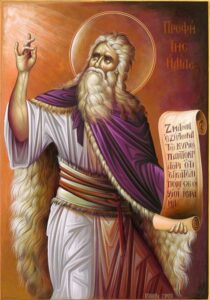
The Prayer of a Righteous Person is Powerful and Effective (James 5: 16)
Holy Prophet Elijah, Elias, Elia (Hebrew- Eliyahu) is one of the most interesting, impressive, bright, and brilliant figures of all biblical characters, yet his life was so filled with ups and downs and a life of turmoil too. Elijah was at times bold and decisive and at other times fearful and tentative. Elijah, a prophet of God whose name means “my God is the Yahweh” whose message of his life matched his name. He belonged to Tishbeh in Gilead. Nothing is known of his family or birth. His name is threaded in the OT, as well as sprinkled in the NT. The story of his prophetic career in the northern kingdom of Israel during the reigns of Kings Ahab and Ahaziah is told in 1 Kings 17–19 and 2 Kings 1–2 in the Bible. He walked, talked, and encouraged others to believe that truly the Lord was God. Elijah the prophet who heard God, a man who walked in obedience to God, stood with faithfulness to God, alone. He trusted and experienced God’s provision. He was a prayer warrior, who stood, and God wrought miracles through him. He was brave. He hated and confronted evil. We have a lot to learn from the life of Prophet Elijah.
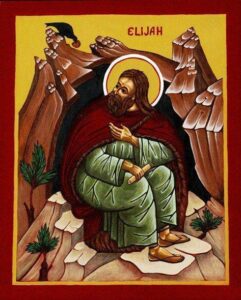
Elijah, the prophet, first appears suddenly in 1 Kings 17: 1, to challenge Ahab, an evil king who ruled the Northern Kingdom from 874 to 853 BC. Elijah prophesies a drought to come upon the whole land, as consequence for Ahab’s evil (1 Kings 17: 1–7). Warned by God, Elijah hides near the brook of Cherith where he is fed by ravens. As the drought and famine in the land deepen, Elijah meets with a widow in a neighboring country, and, through her obedience to Elijah’s request, God provides food enough for Elijah, the woman, and her son. Miraculously, the widow’s barrel of flour and jar of oil never ran out (1 Kings 17: 8–16). The lesson for the believer is that, if we walk in fellowship with the Lord and obey Him, we will be open to His will. And when we are in God’s will, He fulfills all our needs, and His mercy to us never runs short.
We next see Elijah as the central character in a face-off with the prophets of the false god Baal on Mount Carmel (1 Kings 18:17-40). The prophets of Baal called upon their god all day long to rain fire from heaven to no avail. Then Elijah builds an altar of twelve stones, digs a ditch around it, puts the sacrifice on the top of wood and calls for water to be poured over his sacrifice three times. Elijah calls upon God, and God sends fire down from heaven, burns the sacrifice, the wood, and the stones and licks up the water in the ditch. God proved He was more powerful than false gods. Herein we are called to remember the way Prophet Elijah cried out: And it came to pass, at the time of the offering of the evening sacrifice, that Elijah the prophet came near and said, “Lord God of Abraham, Isaac, and Israel, let it be known this day that You are God in Israel, and I am Your servant, and that I have done all these things at Your word”.
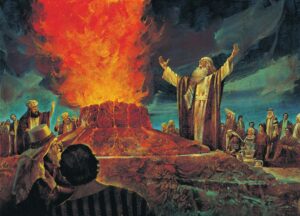
Hear me, O Lord, hear me, that this people may know that You are the Lord God, and that You have turned their hearts back to You again.” Then the fire of the Lord fell and consumed the burnt sacrifice, and the wood and the stones and the dust, and it licked up the water that was in the trench. Now when all the people saw it, they fell on their faces; and they said, “The Lord, He is God! The Lord, He is God!” (1 Kings 18: 36-39; NKJV)
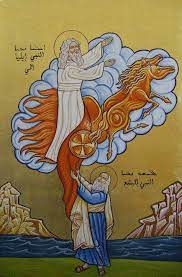
Elijah flees the wrath of the vengeful Jezebel by undertaking a pilgrimage to Mount Horeb (Sinai), where he is at first disheartened in his struggle and then miraculously renewed. Elijah’s deepest prophetic experience takes place on his pilgrimage to Horeb, where he learns that God is not in the storm, the earthquake, or the lightning. God is invisible and spiritual and is best known in the intellectual word of revelation, “the still, small voice.” Prophet Elijah, also appeared with Moses to Christ when He was Transfigured on Mount Tabor before James, Peter and John (Mt.17: 1-3; Mk.9: 2-8; Lk.9: 27-36), thus traditionally representing both the prophets of Israel and all the living because he was taken up alive into heaven on the fiery chariot (2 Kings 2:1,6-14), leaving a legacy behind, his cloak for his successor Prophet Elisha. He is commemorated by Christians on July 20 and is recognized as a prophet in Islam.
Anin Moriyo! Anin Moriyo!! Anin Moriyo!!!
A great, solemn and a very important part of the Divine Liturgy is the Epiclesis, the invocation of the Holy Spirit. During the time of Epiclesis, we hear the celebrant crying aloud to the Lord Almighty ‘Answer me O Lord / Anin Moriyo/ Karthave ennodu uththaram aruli chayanname’ so that the Holy Spirit be pleased, to transform the offering to the very Holy Body and Blood of our Lord!
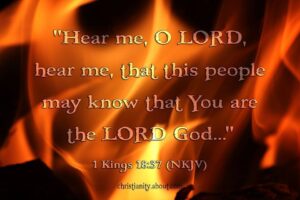
Elijah is an illustration that it is not the vessel but God in the vessel that demonstrates power. After the great victory over the false prophets, rain once again falls on the land (1 Kings 18: 41-46). The prayer of a righteous person is powerful and effective. Elijah was a human being, even as we are. He prayed earnestly that it would not rain, and it did not rain on the land for three and a half years. Again, he prayed, and the heavens gave rain, and the earth produced its crops. (James 5: 16 -18)
However, despite victory and provisions from the LORD that he receives, Elijah enters a period of wavering faith and depression (1 Kings 19: 1-18). Hearing that Ahab’s wife Jezebel has made a vow to kill him, Elijah feels sorry for himself, hides in a cave, and even comes to believe that he alone was left of the prophets of God. He got his eyes off of God and onto the details. It is then that the LORD instructs Elijah to stand on the mountain as the LORD passed by. There is a great wind, an earthquake, and then fire, but God is not in any of those. Then comes a still, small voice in which Elijah hears God and understands Him. When Elijah stopped focusing on the fear of what men could do and his feelings of being alone, God’s voice was heard, and Elijah went on to be taken up to heaven in a whirlwind (2 Kings 2: 1-11).
Just as for Elijah, when the believer focuses on the noise and the tumult of life in this world, we may get our eyes off the LORD. However, if we listen for His still, small voice and walk in obedience to His Word, we find victory and reward. Each biblical character we study has a lesson for us to use in our walk as believers. Elijah was filled with human frailties yet was used mightily of God.
0 Comments